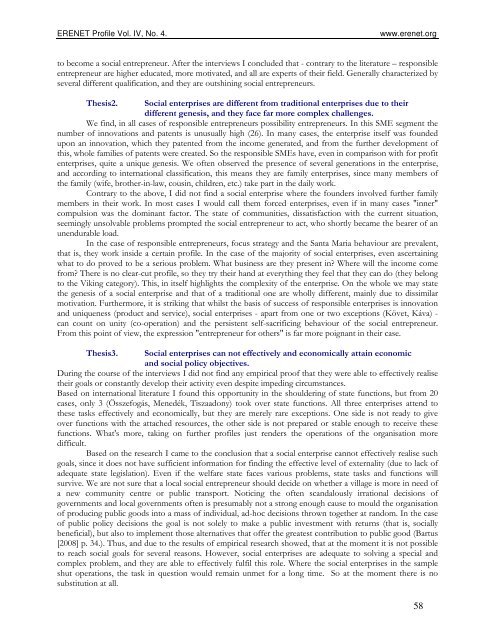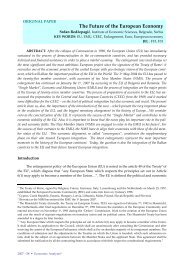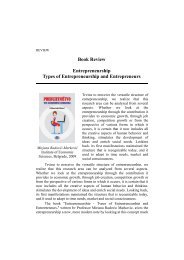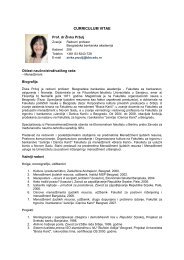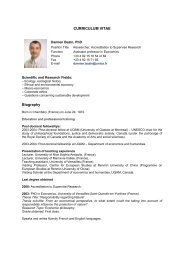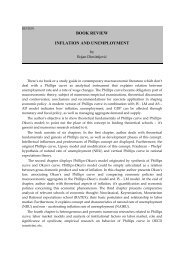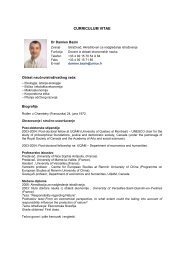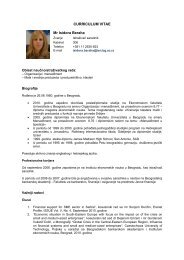Issue 16
Issue 16
Issue 16
Create successful ePaper yourself
Turn your PDF publications into a flip-book with our unique Google optimized e-Paper software.
ERENET Profile Vol. IV, No. 4.<br />
www.erenet.org<br />
to become a social entrepreneur. After the interviews I concluded that - contrary to the literature – responsible<br />
entrepreneur are higher educated, more motivated, and all are experts of their field. Generally characterized by<br />
several different qualification, and they are outshining social entrepreneurs.<br />
Thesis2. Social enterprises are different from traditional enterprises due to their<br />
different genesis, and they face far more complex challenges.<br />
We find, in all cases of responsible entrepreneurs possibility entrepreneurs. In this SME segment the<br />
number of innovations and patents is unusually high (26). In many cases, the enterprise itself was founded<br />
upon an innovation, which they patented from the income generated, and from the further development of<br />
this, whole families of patents were created. So the responsible SMEs have, even in comparison with for profit<br />
enterprises, quite a unique genesis. We often observed the presence of several generations in the enterprise,<br />
and according to international classification, this means they are family enterprises, since many members of<br />
the family (wife, brother-in-law, cousin, children, etc.) take part in the daily work.<br />
Contrary to the above, I did not find a social enterprise where the founders involved further family<br />
members in their work. In most cases I would call them forced enterprises, even if in many cases "inner"<br />
compulsion was the dominant factor. The state of communities, dissatisfaction with the current situation,<br />
seemingly unsolvable problems prompted the social entrepreneur to act, who shortly became the bearer of an<br />
unendurable load.<br />
In the case of responsible entrepreneurs, focus strategy and the Santa Maria behaviour are prevalent,<br />
that is, they work inside a certain profile. In the case of the majority of social enterprises, even ascertaining<br />
what to do proved to be a serious problem. What business are they present in? Where will the income come<br />
from? There is no clear-cut profile, so they try their hand at everything they feel that they can do (they belong<br />
to the Viking category). This, in itself highlights the complexity of the enterprise. On the whole we may state<br />
the genesis of a social enterprise and that of a traditional one are wholly different, mainly due to dissimilar<br />
motivation. Furthermore, it is striking that whilst the basis of success of responsible enterprises is innovation<br />
and uniqueness (product and service), social enterprises - apart from one or two exceptions (Követ, Káva) -<br />
can count on unity (co-operation) and the persistent self-sacrificing behaviour of the social entrepreneur.<br />
From this point of view, the expression "entrepreneur for others" is far more poignant in their case.<br />
Thesis3. Social enterprises can not effectively and economically attain economic<br />
and social policy objectives.<br />
During the course of the interviews I did not find any empirical proof that they were able to effectively realise<br />
their goals or constantly develop their activity even despite impeding circumstances.<br />
Based on international literature I found this opportunity in the shouldering of state functions, but from 20<br />
cases, only 3 (Összefogás, Menedék, Tiszaadony) took over state functions. All three enterprises attend to<br />
these tasks effectively and economically, but they are merely rare exceptions. One side is not ready to give<br />
over functions with the attached resources, the other side is not prepared or stable enough to receive these<br />
functions. What's more, taking on further profiles just renders the operations of the organisation more<br />
difficult.<br />
Based on the research I came to the conclusion that a social enterprise cannot effectively realise such<br />
goals, since it does not have sufficient information for finding the effective level of externality (due to lack of<br />
adequate state legislation). Even if the welfare state faces various problems, state tasks and functions will<br />
survive. We are not sure that a local social entrepreneur should decide on whether a village is more in need of<br />
a new community centre or public transport. Noticing the often scandalously irrational decisions of<br />
governments and local governments often is presumably not a strong enough cause to mould the organisation<br />
of producing public goods into a mass of individual, ad-hoc decisions thrown together at random. In the case<br />
of public policy decisions the goal is not solely to make a public investment with returns (that is, socially<br />
beneficial), but also to implement those alternatives that offer the greatest contribution to public good (Bartus<br />
[2008] p. 34.). Thus, and due to the results of empirical research showed, that at the moment it is not possible<br />
to reach social goals for several reasons. However, social enterprises are adequate to solving a special and<br />
complex problem, and they are able to effectively fulfil this role. Where the social enterprises in the sample<br />
shut operations, the task in question would remain unmet for a long time. So at the moment there is no<br />
substitution at all.<br />
58


